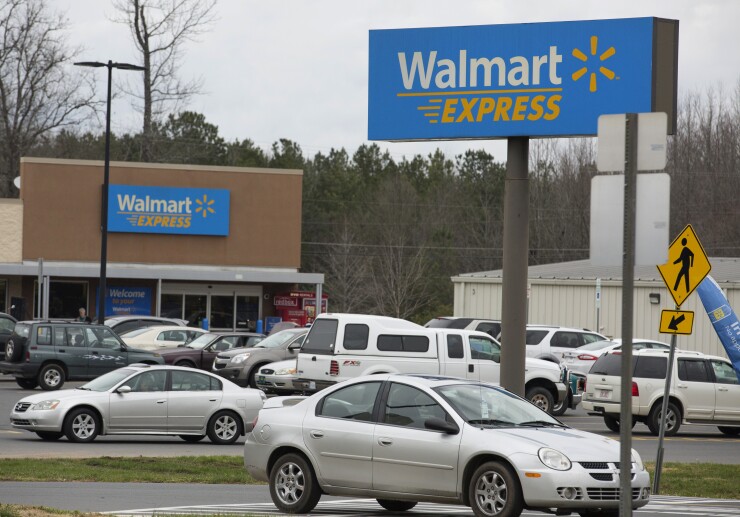
The retailer plans to integrate its pay-by-bank option with the Clearing House's
Walmart's real-time pay-by-bank service, which is part of its Walmart Pay digital wallet, will be available in early 2025, following the release of its original service earlier this year.
Pay-by-bank, or account-to-account payments, are an older product but have gained traction during the recent inflation wave and growing
By adding speed to A2A payments through real-time processing, Walmart can market to consumers that are wary of card expenses. The retailer is also enrolling consumers to build a base for other financial services products through One, its majority-owned fintech.
Walmart's A2A moves are a major development for real-time payments, pay-by-bank and the overall retail industry in the U.S., according to Elisa Tavilla, director of debit payments for Javelin Strategy & Research.
Thirty-three percent of banks offer FedNow and an additional 43% plan to offer it, according to
"As the world's largest retailer, Walmart could make a critical impact on how consumers pay, given Walmart's scale, customer base and transaction volume," Tavilla said. "Most consumers are not familiar with pay-by-bank or instant payments, but Walmart is helping build awareness and adoption."
Despite its influence, Walmart will face challenges in getting consumers to use its payment system. Walmart was initially part of Merchant Customer Exchange's CurrentC, a merchant-led effort to counter Apple Pay that
"There is a long history of retailers trying to create their own independent payment systems, both on their own and through cooperation with other retailers," said Aaron Press, research director of worldwide payment strategies for IDC. "The challenge is getting consumers to switch. These systems almost always benefit the merchant but have limited value to the consumer."
Walmart is positioning the addition of real-time payments to A2A as a way for consumers to avoid stacked transactions that are processed over one to three business days, which can create overdraft risk.
"Getting consumers to sign up for any new payment option, including pay-by-bank, will likely require a combination of additional incentives such as an enrollment bonus, ongoing discounts or rebates, and a notably improved checkout experience," Press said.
Real-time networks are also a good option to fund digital wallets, which could work in Walmart's favor, according to Press, noting Walmart and other merchants have had success with proprietary wallets that carry consumer incentives.
"Adding additional incentives to manage loads via real-time networks would benefit both consumers and merchants," Press said.
Walmart's expanded A2A processing will use Fiserv's NOW Network, which supports the RTP network and FedNow, enabling interoperability between the two systems.
"We expect this new option for real-time consumer payments will further help provide shoppers with even greater choice in paying online," Walmart's public relations office said in an email. Fiserv did not respond to a request for comment.
Walmart's success will depend on how well they are able to encourage consumers to switch away from cards as a default payment method within Walmart's digital wallet, said Zil Bareisis, a senior analyst at Celent. "Consumers are creatures of habit, and many like the familiarity, rewards and other perks that come with cards."
A second challenge is handling exceptions, such as returns. "What would happen if the customer wanted to return an item back to the store?" Bareisis said.
Another question is around managing risk. While real-time payments settle much faster than ACH, it's unlikely to be as quick as the arrival of the card authorization message, Bareisis said.
"Without authorization and payment guarantee offered by the card schemes, the risk remains that even the initiated payments may not settle, leaving the merchant at risk, especially if the customer is walking out with a large basket," Bareisis said, adding that while Walmart may have the scale to manage this risk, merchants that want to replicate the strategy may not. "I am sure Walmart has the know-how to manage that risk, but many smaller merchants won't."






